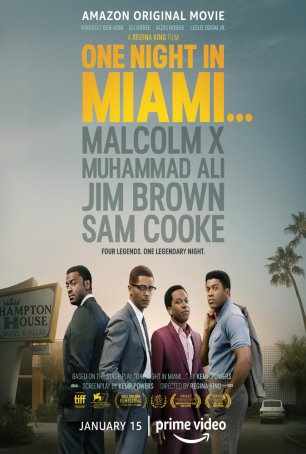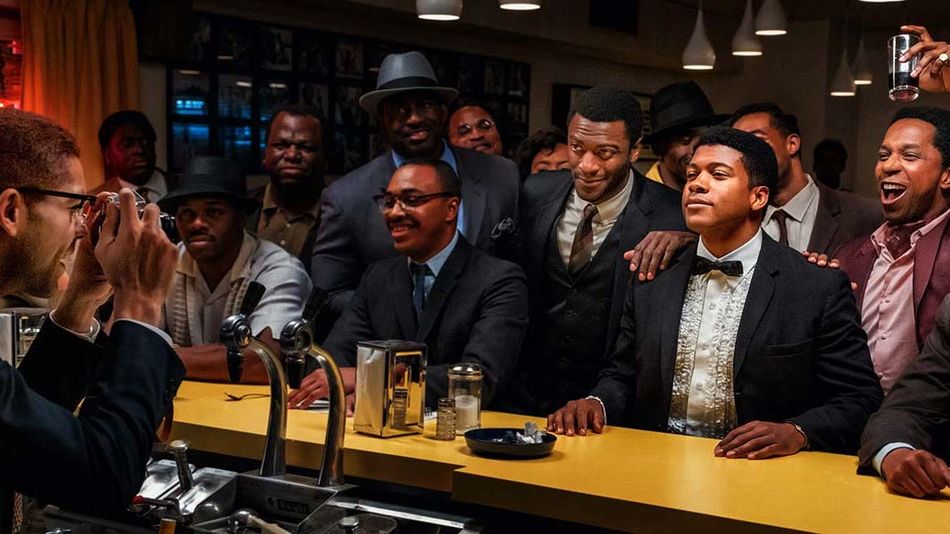One Night in Miami (United States, 2020)
January 06, 2021
By some accounts, the event forming the basis of One Night in Miami may have happened. If it did, however, nothing is known about what was said when four black icons of the 20th century gathered following the unexpected boxing victory of Cassius Clay over Sonny Liston on February 25, 1964. Imagine being a fly on the hotel room wall and listening in on the conversations among the quartet: Clay (Eli Goree), Malcolm X (Kingsley Ben-Adir), Jim Brown (Aldis Hodge), and Sam Cooke (Leslie Odom Jr.). Kemp Powers did – he wrote a speculative stage play in 2013 and adapted it for this film version. Although not a word of what Powers wrote is based on reality (at least insofar as the dialogue is concerned – and this movie is all about the dialogue), it’s nevertheless a fascinating exploration of the kinds of things these four individuals might have discussed.
The date represented a turning point. Clay’s victory in the ring catapulted him into the international spotlight in a way that had never previously been the case. It happened at a time when he had decided to become a Muslim and change his name to Cassius X (and, eventually, Mohammed Ali). His mentor, Malcolm X, was becoming disillusioned with the Nation of Islam and was on his way out. He would soon be at odds with the organization and, a year later, would lie dying on the floor of Manhattan’s Audubon Ballroom, the victim of an assassination. NFL great Jim Brown was giving up football for acting and singer/record producer Sam Cooke was a top figure in the music industry – a position from which he would be dislodged before the end of 1964 by a fatal gunshot.
While the bonds among the four men run deep, there are also conflicts and it’s through those that the men’s personalities emerge. The most overt division – one that starts as a simmer but quickly boils over – is between Malcolm and Cooke. Malcolm accuses his “brother” of pandering and asks how a white man like Bob Dylan could write something more in tune with the struggles of the oppressed than anything to emerge from Cooke’s pen. (He’s referring to “Blowing in the Wind.”) Sam is offended, arguing that for black people, liberty isn’t just a political term, it’s about “economic freedom.” Brown wonders whether Malcolm’s rhetoric is designed to prove something to other black people (especially those with darker complexions) than to white people. Clay, meanwhile, expresses doubts about his conversion, especially when Malcolm reveals his decision to leave the Nation of Islam (not due to a lack of faith in the religion but in the people running this sect).
 With the intimacy of live theater not available, two hours
of dialogue could easily have become a dry (albeit intellectually engaging)
experience. Actress-turned-first time director Regina King uses shot selection
to emphasize her actors’ strengths, generating an immediacy that gives One
Night in Miami a cinematic signature. King’s approach to the material isn’t
to wipe away the film’s stage source but to provide it with a new, independent
life. There are times, especially during the first half, when the pace is
sluggish but, once the various conflicts emerge, there is passionate, riveting
drama to be found.
With the intimacy of live theater not available, two hours
of dialogue could easily have become a dry (albeit intellectually engaging)
experience. Actress-turned-first time director Regina King uses shot selection
to emphasize her actors’ strengths, generating an immediacy that gives One
Night in Miami a cinematic signature. King’s approach to the material isn’t
to wipe away the film’s stage source but to provide it with a new, independent
life. There are times, especially during the first half, when the pace is
sluggish but, once the various conflicts emerge, there is passionate, riveting
drama to be found.
The four principal actors approach their roles with a similar style, mixing imitation with performance. The portrayals are too nuanced to be labeled as mimicry and the actors are good enough to disappear into the characters. The most difficult job belongs to Kingsley Ben-Adir, whose Malcolm X exists in the very long shadow of Denzel Washington’s definitive interpretation. Ben-Adir is effective but, like other actors portraying Patton after George C. Scott, he feels at times like an imposter. Eli Goree captures the showmanship of Clay while finding a human side to the bigger-than-life boxer. Aldis Hodge’s Jim Brown has a powerful presence and Leslie Odom Jr.’s Sam Cooke shows the passion underlying the showman.
 It goes without saying that the sum and substance of One
Night in Miami addresses not only the racial dynamics of the 1960s but
those of today, as well. The uneven and inconsistent progress made during the
56+ years since the date in the title has allowed the movie to view 1964
through a contemporary lens (or perhaps that should be vice versa). Some things
have changed, to be sure, but the root of frustration is that everything
hasn’t. Many of the ideas and arguments advanced by the real-life voices in
this film will find purchase with today’s viewers – an indication that society
hasn’t advanced as fully or quickly as some would like to believe.
It goes without saying that the sum and substance of One
Night in Miami addresses not only the racial dynamics of the 1960s but
those of today, as well. The uneven and inconsistent progress made during the
56+ years since the date in the title has allowed the movie to view 1964
through a contemporary lens (or perhaps that should be vice versa). Some things
have changed, to be sure, but the root of frustration is that everything
hasn’t. Many of the ideas and arguments advanced by the real-life voices in
this film will find purchase with today’s viewers – an indication that society
hasn’t advanced as fully or quickly as some would like to believe.
As a movie, One Night in Miami should work at least as well in a home setting as in a theater. It’s rich with ideas and dialogue and relies heavily on the four main performances. It gets the characters and doesn’t lose them in the process of italicizing its messages. Although inconsistently paced, there’s enough compelling material here to make for a challenging and thought-provoking fly-on-the-wall’s perspective.
One Night in Miami (United States, 2020)
Cast: Kingsley Ben-Adir, Eli Goree, Aldis Hodge, Leslie Odom Jr.
Home Release Date: 2021-12-07
Screenplay: Kemp Powers, based on his stage play
Cinematography: Tami Reiker
Music: Terence Blanchard
U.S. Distributor: Amazon Studios/Prime Video
U.S. Release Date: 2020-12-25
MPAA Rating: "R" (Profanity)
Genre: Drama
Subtitles: none
Theatrical Aspect Ratio: 2.35:1
- (There are no more better movies of Kingsley Ben-Adir)
- Bob Marley: One Love (2024)
- (There are no more worst movies of Kingsley Ben-Adir)
- (There are no more better movies of Eli Goree)
- (There are no more worst movies of Eli Goree)
- Hidden Figures (2016)
- (There are no more better movies of Aldis Hodge)

Comments